#my own branch does not have a makerspace!!
Explore tagged Tumblr posts
Text
Tell me why I was attacked in my discussion board post for class??? I literally just picked some goals a library had listed in their strategic plan and talked about ways to meet those goals and people replied saying the goals were unrealistic for a ton of smaller libraries because they don’t have the resources and I’m like bitch I talked about one library and they made this goal for themselves what are you TALKING about
#my thoughts#I work in a public library I know makerspaces aren’t realistic for all libraries#my own branch does not have a makerspace!!#but the singular library I’m talking about made this a goal for themselves because they DO have the space and resources#I literally just said the library would need to survey the area to see what kind of makers are in the community and what equipment they nee#and I had three comments#Two of which seemed hostile that not all libraries could have a makerspace#I’m like that’s not what I was talking about and I know that?????#why am i seeing tumblr esque reading comprehension issues in my graduate discussions boards#time to write a polite but firm “you fucking idiot response
6 notes
·
View notes
Text
On the subject of Making
From: Garnet Hertz
I made a Google Form to collect ideas in regards to an organization to fill the gap left after Make threw in the towel and closed their doors. The full responses are included below. At this point, it looks like something will be organized for sure... or at least I'll be starting up something. Thanks to Mitch Altman, Karen Marcelo and members of Nettime for sharing. There are piles of good ideas here: which of these do you think are the most important?
Here are the raw, unedited responses to the question "If you were running an open source maker-oriented organization that filled the gap left by Maker Media ceasing operations, how would you run it and what would you focus on?"
76 responses:
• Model it after dorkbot but instead of having meetings it can be geared around smaller regional Faires
• I would run it as a non profit and make sure that there are people from all over the world representing. Not only so US focused.
• Focus on low tech and tech critism...as much as possible far from western culture...let say the gambiara creative movement in LATAM (brazil) or Cuban style repair culture guerilla, community envisioned and run publications/workshops/happenings without the 'red tape' so often discussed as part of the Maker Media legacy. so, no forced branding, no forced commonalities (other than perhaps a shared manifesto), no minimum number of participants or fundraising requirement for it to be a 'real' event of the community, and much less of a focus on attracting, and then satisfying, corporate sponsors.
• Should be about critical making, open source, skill sharing, critical thinking and more...
• I think the most important thing is to help local people meet up with each other in person. This should go far beyond people who already go to a hackerspace - this is something that Make did well by bringing together all sorts of people from children, university students, hackers, artists, etc. I don't think this has to be large scale.
• Member-run co-operative; leadership positions only for women; women-only days; focus on understanding biases built into technologies and imagining ways around this (critical technical practice)
• Money. Without money you can’t go far
• Projects how tos. Wait. That's Instructables. Never mind.
• cats, and i'd not run it... i would do unconferences, get space, and allow people, provide limited scheduling facilities.
• Support groups with least access to money, education, and resources to setup, lead, and run such an entity.
• I would focus on local groups with local, f2f contacts and a (funding-)mechanism to facilitate the exchange of primarily people as visiting makers instead data-platforming and global marketing.
• A mostly decentralised movement that prioritises shared ideas over branding, focusing on providing easy-access models for small, local communities to start shared spaces and hold events.
• I'd make an organisation of organisations, and invite contributions from different organisations. If I was making a publication, I think I'd go with an interview format and I'd interview two or more organisations at once - inviting them to discuss their operations, their experiences and their hopes, together.
• Ideally, a new organization would be a resource, and not an organization. I think open-source maker communities are singular to the their local communities and their local interests. A global community that allowed the specificity of local/regional interests to shine is more important to me than an 'engineered' (imposed?) idea of maker-dom. I enjoyed the broad definition of making that Maker Media cast, but I think the organization was actually dominated by specific technologies and approaches to technology. I'd like to see an organization that could get past that.
• I would focus on positive technology that attempts to help us instead of just consumer goods
• Community building by featuring projects by makers through events and publications.
• I'm not sure if it needs a replacement, aren't the maker faires run independently? Also a printed magazine isn't something that many technology interested people buy in 2019. A website that collects nice projects and tutorials would be enough.
• Education of kids. the best energy seemed to be in helping people learn
• On content by the community (electronic media) and events
• I would run it as a collective that will use their power to make an impact in society. Use the power of us, humans to make our home planet better. I would focus on philosophy and ideas, since ideas are bulletproof and no one can’t take them away.
• n my market no matter the name of a brand, people do not come because the brand comes to create community
• Non-profit, volunteer-based, brutally and radically self-sustaining.
• a bit like hackaday but with a broader focus
• Celebrating and sharing builds.
• I currently part of a maker oriented NGO in Mexico, and our experience is that there are a lot of oportunities to fund and create open content. We get funds from bigger organizations like USAID, Save theCHildren and others to fund open programs like meteorito.io or robolution,mx, that anyone who speak spanish can use.
• Sustainability is challenge. What happened to Maker Media will happen again if you are a single entity trying to make ends meet. I would rather take a different approach. More about it below.
• I would still run it as a media and marketing company. Similar to how many makerspaces stay funded by offering production, design and development services utilizing their existing resources to for-profit companies. By providing some form of value-added business in a tangential indistry separate from the niche maker media was filling, (I know, you had the magazine, but magazines aren't big money makers these days. I'm thinking of something like a peer-to-peer lending platform that allows makerspaces and small businesses to fund expansion or a marketing and development support agency and platform that sells a specific set of services or products. ) that then turns around and uses it's profits to fund the sort of programs Maker Media was running. Does it suck to end up spending 80% of your time designing a UX system for a loan platform instead of planning maker faires? Yep. But a separate business organization that just has a charter to provide funding for a maker-centric organization out of it's profits can survive a bad turn a lot easier than the two being the same organization.
• Reach out to schools and do lots of mini fairies and training to get kids ready for the faire...
• Youth and education. If you inspire the next generation you guarantee longevity.
• I would not take VC. I would make an education and technology outreach non profit. I would make it just an events company, focussing on a few big, profitable events in a year in less expensive locations plus smaller community events. It doesn't have to make a killing, just enough to make ends meet.
• I am always more interested in seeing what strange things individuals make instead of groups.
• alternative energy
• I'd focus on reaching kids who don't have a ton of money, and teaching them how to get started on a shoestring in the world of making. Stop with satellite design and get into how to use openscad, how to tune a budget printer, things like that. Maybe teach people how to bring this stuff into schools and get started there. Maybe showcase some kids programming stuff each issue.
• Exclusive: Magazine, limited pre-release hardware, baubles. Growth: YouTube
• As a non profit.
• Focus on education to the widest audience. Not sure of the best model for running.
• A shared interest organization like Foundation or Cooperation on regional based clusters. Focus should be on life long learning and sharing resources and knowledge.
• Not For Profit - Focus on inclusion and education of the core making skills that are developed through designing, building and coding.
• coop, not too pricy, but not free
• Accessible workshops and showcases of diverse creators.
• Event organization to have people meeting all together
• A web/editorial site, with a modest branching off to video. I would not do the maker fairies and events because I am not good at event planning. But I would TOTALLY love to go to some more maker faires as both an attendee, and a presenter
• Building projects together as a group.
• I would run it with the goal of educating and providing tools to communities regarding electronics and maker skills
• Non-profit. Non-exclusive. Encouraging. Run by a team who think deeply about the impacts of their actions and go to great lengths to learn both in their areas of personal interest and in areas that are for the good of the global community.
• Non-profit with a benevolent dictator. Org holds the brand, collects grants, and gives out money city by city to recognize what people are already doing. The org would also certify maker educational content and products as a revenue stream through an open access review process, similar to academic journal reviewing. That said, primary focus would be on building awareness.
• Online daily content(curating from sources worldwide), long term brand partnership, spotlight on the makers themselves, low on staff- use local partners for all events
• how to run an organization is a question for an online poll?, I don't know even how to cook
• i would focus on keeping on supporting the community
• Creativity, diversity, inclusivity
• I run a Bangalore based social business by the name of "Makespace and Open Source Creativity" (www.bangaloremakepsace.org) and we are fully sustainable and have been operating successfully for the last 5 years. We gain revenues by hosting and conducting workshops for the local maker community as well as organize multiple events where the maker community can come together, collaborate in real time, and create connections to start their own "maker ventures". We focus on the "social business" model so it avoids incurring massive debts and costs. Everything is volunteer driven.
• The way it was run isn't a problem. It wasn't a leadership issue,it was a lack of sponsorship.The big tech companies didn't care anymore. Perhaps big events should be nixed in exchange for small local maker faire events.
• Let the healthy events operate themselves. Create a minimalist amount of requirements.
• Forming a non-profit board would be the first step. I personally like consensus-based models like the Circle Way with traditional models like Parlimentary procedure used as needed. I think major focus should be placed on education (NOT just for kids!), supporting novel technologies and models especially when it comes to sustainability, and providing access to the tools, skills and mindsets behind making to diverse communities.
• I subscribed to their magazine once and while I found it interesting, everything seemed a bit advanced and over my head. It would help if they had some material for beginners.
• Make it a playground open for all
• I imagine that organization embedded inside individual educational institutions and organisation. That way it becomes financially sustainable and viable.
• It'd continue to run and focus on education.
• Too tough to answe succinctly , maker faire
• Community is the critical component, and events like Maker Faire have been amazing places to visit that help keep the community active and contributing even when remote.
• Critical social maker issues.... improving urban environments, developing countries, citizen infrastructure solutions
• I would operate with advocacy and accessibility in mind. I would focus on how the maker movement can provide opportunity and equity to people underserved by institutionally-oriented models of production, research and business. I would look for opportunities not only to generate and platform content to this end, but also to find synergy with peers and indies. I would seek to publish quality instructional material, and also journalism on the maker community. I think a guiding principle should be elevating the maker movement's reach and relevancy in local economies.
• If i were? I think, I am
• I believe that Maker Faire actually had difficulty in getting makers to register over time because of bad feelings due to the fact that the business model was for-profit but MF gave no equity to the makers, who are literally the reason for the event. I would hope that such a future organization would be not-for-profit. In the long term, maybe it could even sponsor makers with projects of enormous scope.
• An open source franchise model with a common virtual platform to share "how-to", technical help forums, show and tell, etc. This should be supported with low member fee. Also needed are blueprints on how to have a brick and morter makerspace connecting into the franchise model.
• Would change the name, like Tech or DIY meetups.
• Membership based, maybe with organizational members (like hackerspaces) • 501c3, The community
• My favorite part of Maker Media was the Maker Faires.
• Considering the raise of streaming platforms as YouTube, I would focus on keep doing content and publish or online, keeping the already big community around Maker media.
• Kids first, then hobbyists
• Stop trying to claim the word "Make" as IP and focus on enabling and building the community through faires, meetups, clubs, forums, talks, etc. Give makers a place to go to meet each other, and an audience for their works. Don't promote "maker tax" businesses, but show how DIY can be cheap enough for everybody. Less STEM, less kids, more technical.
• I would run it as a distributed co-op, focussing on sustainability and radical change.
• I'd focus on highlighting the work of underrepresented folks from the start. Without conscious effort, it's easy to show a fairly homogeneous subset of the community.
These are the raw/unedited responses for the question "If you had to pick only one thing for an open source maker-oriented organization to focus on, what would it be?"
• Community
• Smaller annual festivals (east bay maker Faire is a good size) organizing small gatherings so makers can meet makers
• check out OPEN BIDOUILLE CAMP
• maximising the good maker/craft engagements already happening on the grassroots level, rather than taking credit for them.
• Curating
• Small local events for people to show their projects and meet each other.
• Feminism
• Anything and Everything - once the money part of the game is taken care of. Without money, there is no chance to make
• Project how tos. Ugh.
• cats
• For making to focus on local need.
• I would focus on facilitating small-to-medium group ownership of open source projects as common-pool resources.
• Increasing diversity of the maker community by lowering the barrier to entry (financially, geographically, socially).
• Sustainability & Engagement. Yes, I know it looks like two things, but it's not. By this I don't just mean environmental sustainability, I also mean economic and social sustainability: Who's engaged? How is that broadened over time? And how does the organisation sustain itself? In many cases, the answer to "How does the organisation sustain itself?" will lead, by implication, to answering the question "Who is engaged?". (eg: A fablab that's in the orbit of a university will tend only to engage students! eg2: A glossy magazine about the "maker lifestyle" will tend only to engage middle class makers.)
• empowerment
• Teaching self sufficiency
• Ensuring at least one big event was happening annually to get makers together showing their projects.
• Accumulate interesting and useful projects, ideas etc.
• Helping kids create
• Events
• The idea that we can hack the planet for good
• in the community and not in the brands
• Facilitating cooperation, since this is the main thing that individual/independent makers lack in comparison to larger (corporate) structures.
• tutorials
• Celebrating and sharing builds
• Content creation
• Education and Outreach, I think the Make magazine and books were a great enablers.
• By far, I would pair down to just operating a online news site and the maker faires. I'd look at how Cracked brought itself back from the dead as an example.
• Tools to train kids to put on makerfaires
• Support the demonstrating makers
• Outreach focussed events - big ones and community ones. • These events have *enormous* impact on human beings and can make money.
• alternative energy
• Education and levelling the playground socially. This stuff doesn't have to be stupid expensive.
• YouTube
• Events
• Continue the magazine at all costs. It is the source of inspiration for many of all ages.
• Free physical and virtual spaces for learning and creation for all.
• STEAM focused. Especially for school aged children
• micro circuts
• accessible workshops and online materials
• free as in beer
• Community. I don't know how to foster that and not make it all about the money. It's hard because people make cool things and they want to get paid but "community" and "ceaseless self promotion " do not go well together
• Picking some project, and building it as a group with looking at the different elements of engineering, social science and acceptance, and presenting it to a different audience.
• Electrical engineering
• Diversity, equity, and inclusion of varied experience, culture, ideas, and methods.
• Right to repair to build more awareness around making
• Daily online content, but I think going diverse is safer
• I think I would like to focus in providing opportunities for makers that want to teach to teach, for example, I would love to teach programming for free, but havent found the space to do so
• community
• Community. Hands-down. There are many ways to address "Community" but it's the one thing I would pick over other characteristics like "Profit", "Longevity" or "Infrastructure" with respect to an open source maker-oriented organization
• Keep it small, nimble. Cater to the creativity of children, and keep it family friendly.
• Being not for profit.
• Providing access to the tools, skills and mindsets behind making to diverse communities.
• Wow, is that possible? :). I guess Arduino since you can do so many things with it.
• Let neither startup hype/pitch competition people nor social justice/identity politics people grab control over the space.
• Education and accessible technology for all
• Education
• Maker faire
• Community-organized events like Maker Faire I think are the one thing that allowed Maker Media to stand out
• critical approaches to design
• It is hard to pick one answer. I think there are several compelling opportunities for maker organizations focused on specific domains. One would be presenting maker skills in the context of a path to the trades. Another focus would be modernizing (and miniaturizing) common manufacturing processes outside the usual footprint of CNC technologies. I also believe there are a lot of opportunities for makers in agriculture and primary productivity - this is my own personal focus right now.
• Decentralization
• Whimsy. Maker businesses are fine, but there's nothing like the exhibits that elicit pure joy, which are made just because they can be made.
• Access to affordable maker spaces.
• Electronics DIY
• Regional events! Maker Faire Detroit has been so important for connecting makers in the midwest to each other and the rest of the country.
• Community building
• Events -- getting Makers together to talk, teach/share skills, show off their stuff.
• Creaste short videos that detect an issue in a community that could be somehow solved making some artifact, explain the creation process and show the impact it made.
• Physical computing
• Creating user controlled and built technological devices.
• Sustainability!! Many people are already afraid of the future, without knowing what they can do to improve matters. Be a beacon of hope. But also, as things move forward, there will be a lot of demand for this type of solutions. Renewable energy, repurposing/upcycling, interesting ways to produce food, and more. • social capacity building
Lastly, here are responses to the question "Any other thoughts or ideas?" (I've edited out some people's private contact information here, other than that these are the raw responses). Which ones resonate with you?
• the main ideas should realy come from the third world....they are way much more advance
• happy to get involved in helping build this - just let me know :) @c------- / [email protected]
• b-- here. I think the zine, + on demand + downloadable format would be great. Riso !!!
• Thanks Garnet!
• Maybe a how to magazine of critical and speculative design projects?
• well... another metaphor for cats is academia, or herding cats. other • For the organisation to be a meeting space for other locally focused groups not necessarily attached to making to encourage cross fertilisation of ideas.
• "Makers" are people, and community is people -- and we should eschew the platforming tendencies by single individuals, be it TechShop, Fab Lab, Maker Media, P2P, ecology ...
• And as I said earlier, together with m------:
"Shared Machine Shops are not new
Fab Labs are not about technology.
Sharing is not happening. Hackerspaces are not open. Technology is not neutral. Hackerspaces are not solving problems. Fab Labs are not the seeds of a revolution." (http://peerproduction.net/iss…/issue-5-shared-machine-shops/) P---- T------, [email protected]
• Great thoughts and ideas on Nettime. Keep up the good work! Hope to see you again IRL some time. J----
• No DARPA grants
• Open source is a strange thing to focus on. There are many maker companies that eschew open source, and many that require retention of copyright, etc. I wonder why you chose this phrasing.
• Be political neutral, don't force political opinions on people like the left wing Make magazine did.
• I am not sure I am right. This is just my gut reaction.
• Being a “maker” is a way of living based that we can hack everything for better :) we can be better, we have to.
• The maker movement is more alive and latent than ever.
• A post Maker Media organization should imho be membership-based, with membership revenue being the basis of what is possible financially. It would be a kind of global trade organization for makers of all kinds.
• HACK OTHER EVENTS: Attend events that attract makers who don't identify as makers: comicon (almost everyone is a maker there), wood and metalworking trade shows, custom car and bike shows, etc. We grow our community by joining other communities and infecting them with our enthusiasm for blending the disciplines into one big community of makers.
• I think building an alliance or consortium that brings together various organizations and individual is much better idea. The group could consist of organizations who's business is cater to maker community (open hardware companies, open source companies).
• I think the problem you're always going to run into is an issue of that the maker community has always struggled a bit with the idea of business as a part of the movement. At its core, the movement is a hobby to most people, so the vast majority of maker organizations have to or prefer to rely on outside sources of support because if you try to fund a makerspace internally and make business an integral part of it, it just becomes another factory workshop. I don't think it works if the organization funding it is the same one as the organization trying to coordinate the non-profit programs.
• Kinda like a national science faire but more maker oriented.
• S----- H--- is severely underrated and print is dead.
• MF, by it's very nature sort of made it hard for individuals to show stuff because it was just too exhausting. I would like to see a better way to do show and tell among individuals.
• this really sucks!!!!
• We don't need so much focus on Bay Area-type artists. We need to teach people, and especially kids, how to get started for themselves, and then help them develop skills.
• Support the independent makers. They are the "talent".
• For years heard many smaller maker companies lamenting that it was too expensive to participate in a maker Faire. It was a of once a maker made the leap from maker to a maker business Make Media wanted large sums of money to have a booth/representation at an event. This amount was unproportionally large compared to the revenue the business generated. And it all makes sense why the prices were so high when there were venture capitalists that needed to see returns. Treat it the new "Make" as a company of one, then it'll succeed long term. https://ofone.co/ (no, not affiliated with the book in any way)
• Makers are strongly connected to the UN SDG's - find ways to mutual development.
• Co-create strong independent networks, portals, platforms to survive autonomy in times of crises: Signal, Protonmail, etc
• Developing of the next generation of Makers should be something that should span more than just print and digital media. Deeper integration into schools, K12 and Collegiate, to help develop the skills needed to live and work in an Internet connected, coded world.
• do not try to be too big
• I've taken the time to carve out more space in my life to make things now that Make is gone. It felt like they had a handle on the whole making things deal. And that level of fit and finish isn't really my style. I feel like I have more space to just be me and do what I want. I know this is all in my head. I really want the books to continue under a similar imprint. It'd be a shame if they were all discontinued or sold to some soulless corporation.
• More drones!
• Women are makers, and “women’s crafts” are forms of making. People living in poverty are makers, and survival invention in developing nations is a form of making. Learn from Bauhaus’s eff-ups a century ago. Learn from innovation in literal ghettos and tenements.
• "making" is too broad to go mainstream. Folks that grok makerfaire dig it hard, yet folks that don't have no clue what the hell it is. We have a big awareness problem still. Rally around right to repair and teaching folks how to fix stuff so they start taking more stuff apart and questioning how it works.
• If I had the means to start I'd do it myself
• I am sorry to waste your time
• usually monetery and community focussed efforts conflict. it would be great if this was not the case
• Occasional events are better for outreach whereas regular meetups are better for cultivating a specialism
• Consider expanding the Maker Media empire, or whatever is left of it, to the Eastern Hemisphere/East -- India and China are the future, and if Make: had some of its outposts in these economies, radical change could be seen with respect to the global maker movement
• Nothing good lasts forever. Design the business accordingly.
• I attended probably 75% of the NYC MFs, including 2010. I believe the year things changed for the worse was when Barnes&Noble got involved, makers started complaining about the cost to exhibit, and weird unrelated large sponsors showed up (some kind of new soda). The reprap festivals might be a better way to go?
• I think it makes sense at this point to look at how we can form a network of small groups in many places working together towards a common mission with the support of a board providing guidance.
• How, and with whom, can I accomplish this in Reutlingen, Willi Betz Gelände?
• I know people are super sad about MAKE. Me too. It's very nostalgic considering all the friends and community we have made all around the world. But I feel, this is just the passing of an industry from the early stage to a mature stage. This is very similar to all the open source hardware grassroots clubs we had such as the famous Homebrew Club, but today people hardly build computers by hand anymore. We have "matured" into another level of technology.
• It's a cycle. What starts young, will one day become matured and even die off to give birth to something else totally new, while the remnants of the old will get embedded as part of bigger and more financially stable organisations.
• connect up all loal hackerspaces in a city and have them run an event in a conglomeration.
• One thing I feel is lacking in the usual maker pedagogy is fundamental business literacy. People can develop amazing skills through self-study, but business law is arcane by design.
• I think most makers stand to benefit greatly from some content demystifying business licensing, home accounting and independent consultancy work. There are already many organizations promoting independent business, but there seems to be little overlap between these and the maker community.
• The maker faire is a decentralized thing. Most of regional and mini maker faires are on. Perhaps instead of maker Media licenses we could just use a respected and recognized chapter, a document stating what is a maker faire and what is not. If the maker faire trademark will not be available for us, then we will have to think up and to agree on a new name.
• We can do better than Maker Faire.
• If there is a open source franchise model then each location could have a contributed fee that would assist with purchasing of new equipment, insurance, repairs, staffing etc. • It is a lower-cost way of sharing resources instead of having to rely solely on local volunteers or individual sites.
• Half focus on newcomers and other half in veterans. A lot of us started with Arduino, and some made custom PCB, wich is kinda normal.
• Not for profit please :D
• Get youtubers involved, like Simone Giertz, Laura Kampf, Mark Rober,
• Be an actual maker movement, about DIY and tech learning and FUN!, and not a profit-focused startup company. Be genuinely excited about making, not fake excited about selling us marked up crap. Get into the deep dive details.
• Be more like the 8/16 bit computer user group days, the Radio and Electronics days, the glee of building and fixing and modding shit. Be photocopied zine days and not glossy magazine days. More crazy tinkerers, less TED talk. Don't be a fucking TED talk. Never be that again.
• Scrappy and inclusive, not hipster and exclusive. Geezers and kids and adults and teens all treated with respect.
• For god's sake, the project is the star! Fuck "influencers". Nobody is a fucking star of makerdom.
• Engineering is modest, good hacks get kudos. No hate for n00bs. Everybody can come. You can do the thing!
• Make did an amazing job of combining different disciplines into one community. I'd love to see that again.
• stress anti-capitalist and regenerative capitalist models
If you'd like to input ideas, here's the form -
https://forms.gle/SB7FxpJVAyhVwnLp7
- and in reference to Nettime, I'm particularly interested in hearing people (by email) that might be interested in hosting some sort of events that have to do with DIY/art/tech/culture, sort of in the spirit of a revived Dorkbot - please give me a shout.
Thanks! Garnet
See More from Molly Hankwitz
-- Dr. Garnet Hertz Canada Research Chair in Design and Media Arts Emily Carr University of Art and Design 520 East 1st Avenue, Vancouver, BC, Canada V5T 0H2
# distributed via <nettime>: no commercial use without permission # <nettime> is a moderated mailing list for net criticism, # collaborative text filtering and cultural politics of the nets # more info: http://mx.kein.org/mailman/listinfo/nettime-l # archive: http://www.nettime.org contact: [email protected] # @nettime_bot tweets mail w/ sender unless #ANON is in Subject:
1 note
·
View note
Text
Digital Library Initiatives at NCSU vs. Code Camp: A 2-Way Interview
*Originally posted on the METRO Fellows blog
One of my favorite presentations at Code4Lib 2017 was delivered by Kevin Beswick and Nushrat Khan, two librarians with the Digital Library Initiatives (DLI) department at North Carolina State University (NCSU) Libraries. Their talk, Fostering a Departmental Culture of Peer Mentorship in Software Development, covered programs created in response to the growing number of new professionals, student workers and full-time staff entering the library with a desire to advance their software development skills. This certainly isn’t unique to NCSU and in addition to my own experience, I was reminded of a report released last year which reflected on feedback from past National Digital Stewardship Residents. Many of the participants expressed an expectation that tech education would be a larger part of their residency through a mentor or other on-site resource. Dev skills are increasingly necessary in our field but the breadth of library science as a discipline doesn’t leave much room for a comprehensive computer science curriculum, which leads to a lot of independent learning.
My own solution was to pursue a ‘coding bootcamp’ during my fellowship with METRO, I found the teaching techniques to be novel and effective. After meeting at Code4Lib, Kevin and I decided to get together to compare learning methods employed at NCSU with those at code camp. Here’s what came up in our conversation:
[Katie] Let’s start with introductions! What led to your role as Digital Technologies Development Librarian?
[Kevin] I have a background in computer science and I joined NCSU Libraries four years ago as a fellow after graduating from the Masters of Library and Information Science program at the University of Western Ontario. Prior to that I was working at a small academic library at Laurentian University in Canada. I actually had a bit of trouble getting into the US initially because the job duties listed on my offer letter did not match up to the outdated job description of a librarian that the border guards were using as the basis for granting me a work visa. I explained to them that many of the services that libraries offer are now online, and my role as a librarian would be to create, develop and maintain those services. Evidently I could not convince the officers that I was in fact going to be employed as a librarian because I was detained for 4 hours, questioned aggressively, fingerprinted, and ultimately denied entry. Luckily, I was able to re-apply 2 weeks later under a different visa classification and everything worked out.
[Katie] Librarians are still going through this sort of identity crisis. I received my library science degree at Pratt Institute and in my last semester they decided to remove the word ‘library�� from the program title. Now it’s ‘School of Information.’ Digital Technologies Development Librarian kind of encompasses everything–how would you describe the role of the DLI department within the Library?
[Kevin] DLI is one of two IT-related departments in NCSU Libraries. Early on our Vice Provost & Director of Libraries, Susan Nutter, recognized the value of digital initiatives to the future of libraries. DLI was created to support this focus by bringing together a team from across the Libraries. Since then we have developed core strengths in systems analysis and software development. While the IT department in our library is responsible for managing core business services such as the ILS, catalog, electronic resources management system, patron computing, server infrastructure, etc, DLI is more focused on creating and supporting novel library services in collaboration with other library departments. Often, Digital Initiatives departments at other libraries will focus entirely on supporting digital special collections and archives, however our scope is more broad than that – we collaborate with every department in the library on projects. We bring expertise in systems analysis techniques and software development as tools to help solve these challenges.
[Katie] When did DLI become active with the Library’s fellows, and how does the program work?
[Kevin] The fellows program precursed our department, it’s been active now for over 20 years. The fellowship is open to new graduates from Library & Information Science programs, who are appointed as Librarians for a 2-year term, splitting their time between a home department and a strategic initiative that is typically in a different department. In their home department, fellows contribute to the department’s day-to-day projects and activities. Strategic initiative ideas are submitted by departments in advance of interviews, and align with the strategic priorities of the department itself as well as the Libraries as a whole. As part of the interview process, initiatives are pitched to candidates by supervisors, and candidates are encouraged to ask questions about the ones they are interested in. Fellows are matched with home departments and initiatives based on their interests and experience.
DLI tends to get new fellows within the department fairly regularly, and has a good history with fostering professional growth in terms of technology, but hasn’t offered many formal opportunities around this. There was a desire to learn more about software development and the tools/workflows surrounding it, so one day my colleague Bret Davidson and I thought it would be good to talk to the fellows about Git workflows, covering topics essential to working with others, like merging, branching and pull requests. The response was positive overall, so we decided to turn this into a series of software development discussions. We choose topics for future discussions as a group, and they tend to either come out of previous discussions organically, or suggested by someone in the group. So far, the topics have tended to be more around best practices, and about the software development ecosystem rather than core concepts like learning a language or framework – the types of things that newer developers may not be aware of or haven’t had time to really dig into yet. For example, we’ve done sessions on editor/shell configurations, package management, and how to effectively troubleshoot code problems. We try to make the format more of a discussion rather than a lecture, as we recognize that everyone has a different style of working, and brings different knowledge and perspectives to the table no matter their level of experience.
[Katie] The fellowship program sounds really similar to our reverse-pitch application process. I like that each department has a chance to get involved during the interview process because it forms an internal community around the fellows–multiple parties are interested and invested. What are some examples of past or current projects?
[Kevin] Nushrat Khan, who presented with me and who is a home department fellow in DLI, is working on an initiative in the Acquisitions & Discovery department that explores linked data and the semantic web. She has been spending time performing an environmental scan in this area, and conducting interviews with other departments in the library to understand their needs and identify potential opportunities for collaboration on future projects. In DLI, Eka Grguric has been working on an initiative relating to Open Science and how we can provide support for researchers on campus who are interested in applying these principles to their work. Some outcomes from that initiative have been the development of a workshop series around tools that support open science practice. We’ve also had fellows work on initiatives related to creating programming for and building a community around a makerspace that we’ve opened, creating new workflows for born digital content, creating a program around web archiving to name a few others.
[Katie] You’ve described the focus of all three of our fellowship projects at METRO this year! What kind of learning strategies have generated positive responses?
[Kevin] We currently are doing group discussions, peer to peer consultation, code reviews, and compiling lists of technical resources to assist in learning skills that will help fellows in their future professional careers. We’re furthest along with the discussion series as a program currently, and I think that what started as an opportunity to build skills in software development and be exposed to new approaches or tools has really become something more valuable. In preparing for our presentation, we talked to everyone who has participated in these discussions to learn how it has affected them personally as well as the general culture of the department. We learned that it made them feel that experienced developers were more accessible, and increased their comfort level in asking technical questions to other people in the department. It helped the group become comfortable with one another, and work better together.
Another goal we try to achieve through this is to demystify our work and the development process in general. By leaving these sessions on the more informal side, we can help to expose the real side of doing this kind of work, and figure things out together. I think that the experience of watching a conference presentation, or looking at code for a mature product on GitHub might lead people to believe that developers are magical creatures that can write clean and functional code with relative ease, and never run into problems. This is quite the opposite from the real process, and we try to highlight that by making minimal preparations for each session. We usually base discussions around a relatively lightweight document with a few bullet points, and we try to come with hands-on work that we haven’t done before so we can all experience the process of working through it together. We recently did an introduction to Vagrant and Ansible where we built and provisioned a virtual development server for a small project that none of us really had any experience with. In addition to learning about the technologies and why they are useful, everyone was able to see the real-life process in putting this together and were able to participate in troubleshooting issues.
[Katie] Okay, last question! How do you see other libraries or organizations providing the same kind of support as DLI at NCSU?
[Kevin] We’re lucky to have a department that is big enough to support these types of initiatives. I’ve worked in a smaller library before where there was only one other person who was responsible for technical work. While they were a great mentor that I owe most of my early successes to, it is harder in that type of environment to find communities for peer mentorship. A lot of people in smaller libraries may even be the sole person working on technology-related projects. This has gotten me thinking about opportunities for remote peer mentorship around software development in libraries, and how they could be offered in an effective way. I’ve participated in a remote mentorship program as a mentor before, but there seemed to be very few participants and it didn’t seem like many connections were being made between mentors and mentees. I think the biggest thing that was missing from it was the relationship building component. In order to have a good mentor/mentee relationship, I think trust needs to be established along with some comfort level between the people participating. If we could figure out how to improve that aspect in a remote situation, figuring out the logistical details of making something like this work for software development would likely be trivial in comparison. I’m interested in learning about models where remote mentorship has been successful in the software world and seeing if there are any lessons we can bring back to the library technology community.
Time to switch up interviewer/interviewee roles!
[Kevin] I have been hearing a lot lately about developer bootcamps as a way to build development skills, but I don’t really know much about them. I was very interested to hear that you were currently enrolled in one! What is the typical format of one of these programs? What is tuition cost like?
[Katie] So, private schools focused on teaching professional web developer tools began opening circa 2012 because there was a demand for skills that most formal education neglected to teach outside of CS degrees.
I found that courses vary by school but most include a full-stack intensive that incorporates front-end and back-end technologies through lessons in HTML & CSS, Javascript, Node.JS, React, Ruby on Rails. Surprisingly, soft skills, like how to work on a dev team and learn new languages to stay tech-relevant, are really emphasized.
These typically run between 3-5 months with costs running an average of $2k-$4k for a language based course (eg: javascript, ruby), or $10k-$15k for full-stack. That cost is pretty steep but I found that each site offers options for tuition payments, as well as diversity scholarships and funding for women applicants (General Assembly was a notable exception to this). Grace Hopper Academy is also an option as a women-only code school with deferred tuition that is owed after landing a dev job, but the cost was considerably higher than average.
[Kevin] It is great that most of these programs are putting an emphasis on this issue, and are trying to make them more accessible to women and minorities. Which code school are you enrolled in? Do these programs mostly take place online, or in-person?
[Katie] I went with Dev Bootcamp (DBC) because it had the best combination of schedule/class choice/cost/ratings. It splits the coursework between remote learning and on-site work at a Manhattan campus, which is what most schools provide in cities across both coasts. In terms of how classes are taught, I can only speak to the remote coursework since I’ve yet to reach the on-site intensive portion, but currently, this takes anywhere from 8-15 hours a week. There are also people who are taking a full time approach to this and spending their days deep diving with supplemental learning (like rubymonk, codewars, etc.).
[Kevin] How is the curriculum structured? What does a typical week look like?
[Katie] Classes build in intensity and in mine, the first weeks were spent introducing version control and Git workflow, command line, CSS, HTML, moving into Ruby. These are taught through a series of challenges set up through 5-10 minute videos accompanied by written tutorials developed by DBC instructors.
There are also peer ‘pairing’ sessions that I find to be really helpful and fun. Twice a week you get together with a student via video chat and share your screen to work work through a code challenge together (we mainly use Google Hangouts). Students are located in cities across the United States, and sometimes even abroad (I paired with someone in Berlin last week). They can be anywhere for the remote period. At the start of a pairing, we determine who will be a ‘navigator’ vs. ‘driver.’ The navigator reads through a code challenge while the driver works in Sublime, command line, etc. Often there are aspects of the challenge that have not yet been directly addressed in our lessons, encouraging us to develop online research skills. Overall, this teaches you how to work with a wide range of personalities and causes you to recognize how different people approach both teaching and learning.
Once a week a pairing session will include an instructor who is present to watch as you and another student work, stepping in only if they see an easier approach to a challenge or want to clear up a question. Instructors are also available through a Slack channel we use to post questions and share resources between the cohort. Oh, and there are also daily ‘office hours’ that involve joining students in a video chat where a teacher will be reviewing methods from the week.
[Kevin] It sounds like the curriculum is designed to encourage collaboration and peer mentorship. How does this work out in practice? Are instructors and other students approachable and receptive to questions, or feedback?
[Katie] Peer mentorship is definitely a large part of the program. An unexpected side of dev school is the attention given to behavioral learning. In the first weeks, we were assigned several videos based on psychology studies covering ideas about fixed vs. growth mindset, leadership skills, and the ways different personalities might respond to social or professional challenges. This was meant to assist us with pairing sessions. For example, we are asked to get in the habit of going through introductions at the start of a code challenge to share insight into our mood or feelings about that week’s lessons. You go through this again at the end of the session during an evaluation of your partner’s work when the assignment is completed. Remarks are supposed to include actionable, specific and kind (ASK) feedback regarding their code or their ability to work with you. Theoretically, this improves your habits while working with a development team and although it might seem a little overboard, it quickly becomes normal and is a nice way to remind yourself to be aware of your own behavior.
For more information: Kevin Beswick’s contact info can be found here or tweet him @kbeswick. You can also read about the Digital Library Initiatives Department @ NCSU here. Or, spend more time checking out Dev Bootcamp!
0 notes
Photo
ok i was typing in the tags but it got a bit long.
I highly recommend you go check out your local public library!! here are some of the services my system offers! -a video game station in every branch -vr set ups!! switch games! switch CONSOLES. PS5 games!!! PS5 CONSOLES!!!! -our downtown branch has an arcade cabinet and a room called the gamerspace!! - MAKERSPACES!!! my branch has a sewing machine, a 3d printer, a vinyl cutter!! a digital conversion station!! -our downtown branch has recording software!! A CNC LASERCUTTER (among other CNC machinery) - setllement services for folks new to the city! - outreach workers! our outreach department just got a major expansion! -free scanning!! copies and printing for $0.10 a page!!! if its a government form its free! - english language learning circles! - free online streaming services! free ebook services!! SO MANY FREE ONLINE CONTENT SERVICES -free unfiltered internet access! -services and teams for resume building! job hunting! career upgrading!! - OUR DOWNTOWN BRANCH JUST OPENED A COMMUNITY KITCHEN!!! -a space specifically for Indigenous folks! it was designed with smudging in mind, so it has its own ventilation system! our Elder-in-Residence meets with folks in this space! - elder in residence! writer in residence! historian in residence! poet in residence!! MORE THAT I AM FORGETTING!! - A MUSIC RECORDING AND PUBLISHING COMPANY TO PUBLISH LOCAL MUSICIANS -A PUBLISHING COMPANY!!! TO PUBLISH LOCAL AUTHORS!!! BOTH OF THESE ARE FREE!!! -a heritage section which preserves local authors, including genealogy, yearbooks, memoirs, agricultural reports! -we have countless accomodations including extended loans, home delivery services, online chat services to contact our staff, DAISY format media!! -RADON SCREENING KITS THAT YOU CAN RENT AND TAKE HOME -WIFI HOTSPOTS!! THAT YOU CAN RENT!! AND TAKE HOME!! -AND!!!! MOST PUBLIC LIBRARIES NOWADAYS HAVE COMPLETELY REMOVED LATE FINES!!!!!! THEY’RE GONE!!! -and i didnt even mention the books and movies!! our collections are huge and constantly updating! we have every book you can think of and if we dont, you can order it from a library that DOES to be delivered to your local branch! this includes academic libraries! - GO CHECK OUT YOUR LOCAL PUBLIC LIBRARY THE MORE FOOT TRAFFIC WE GET THE MORE FUNDING WE GET AND THE MORE COOL STUFF WE CAN DO FOR YOU!!!!!!!!
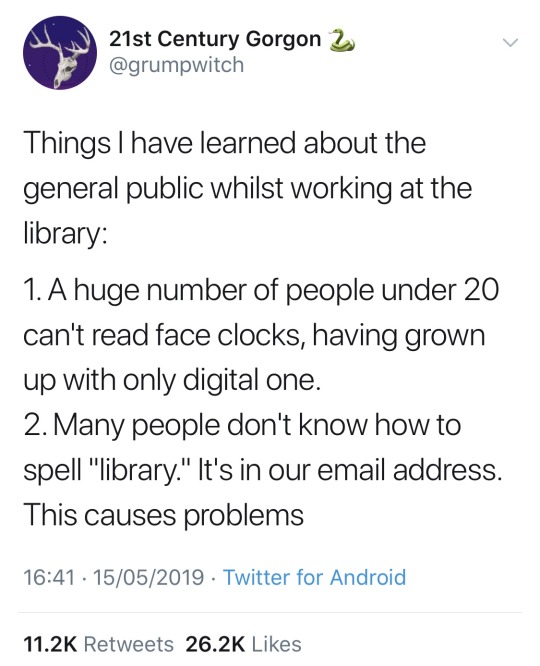
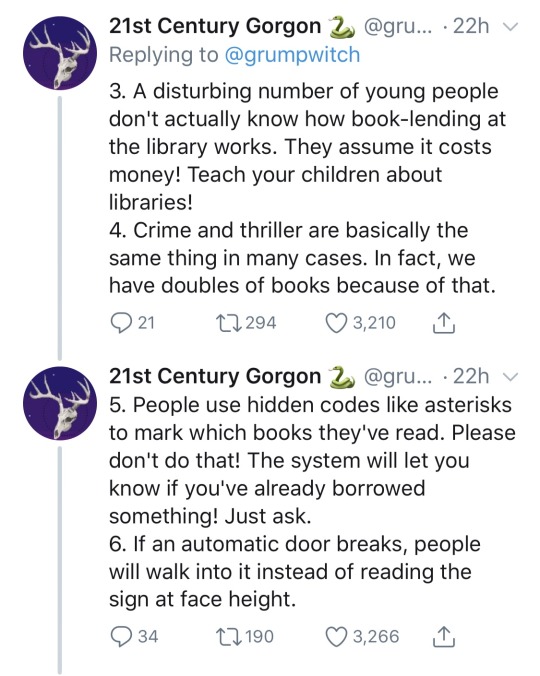
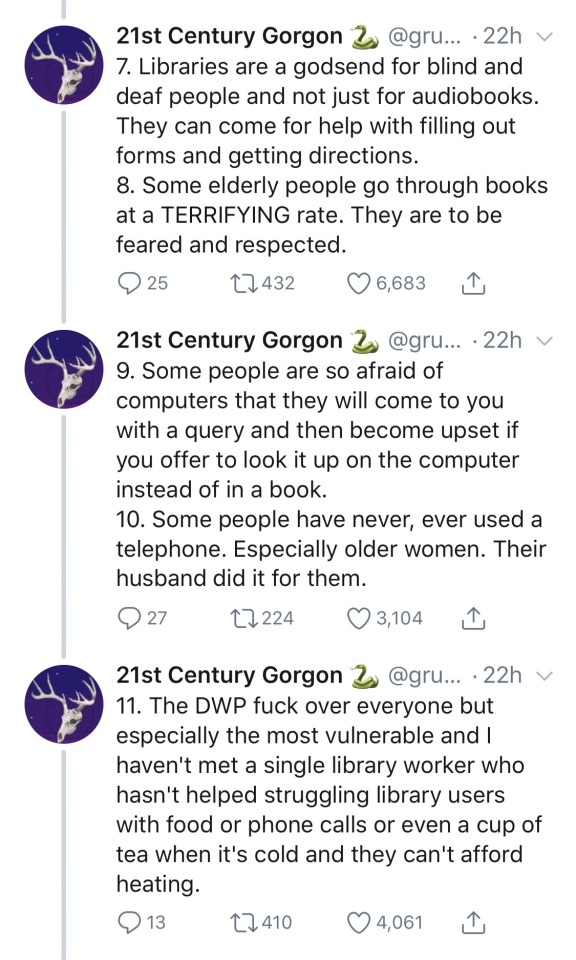
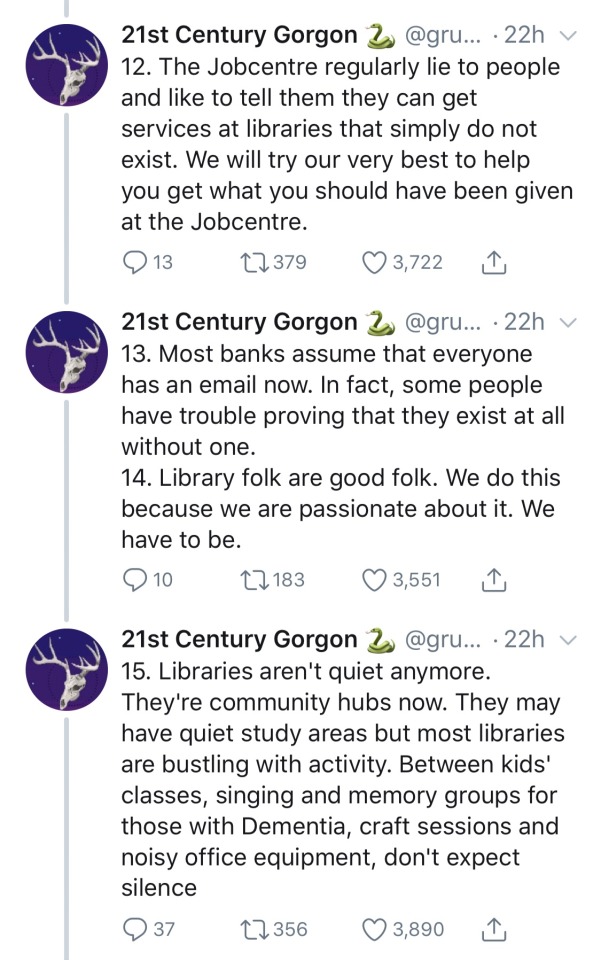
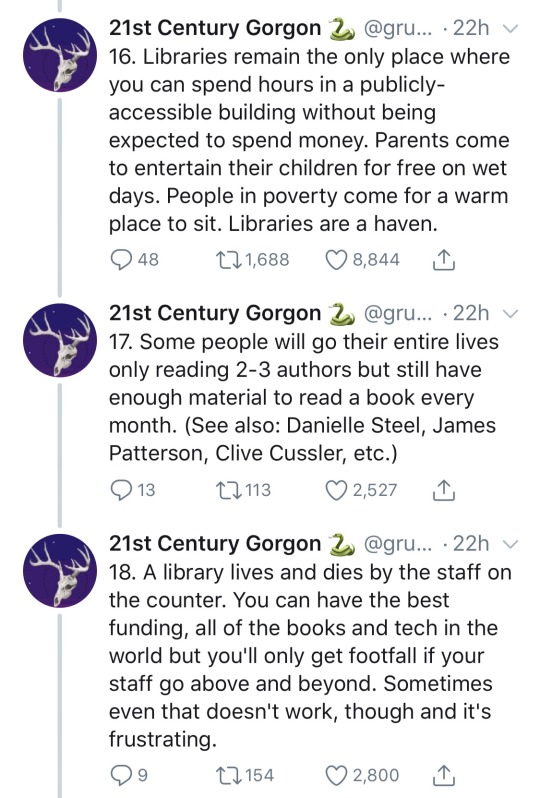
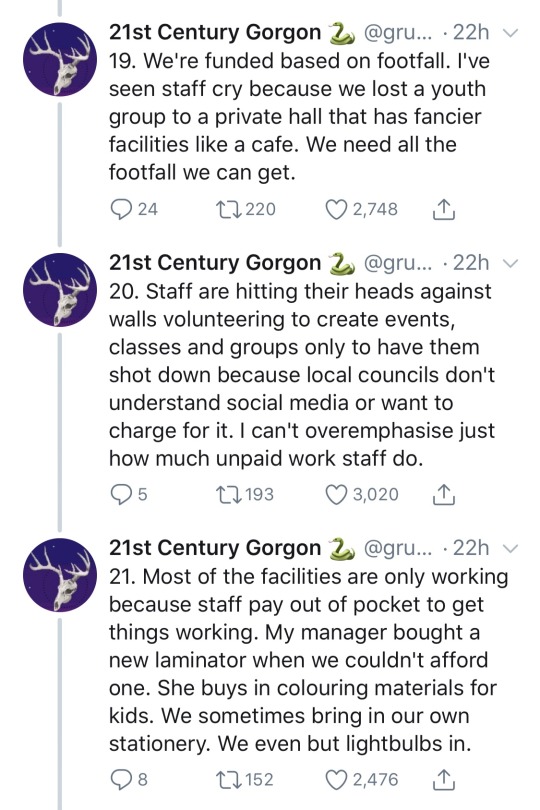
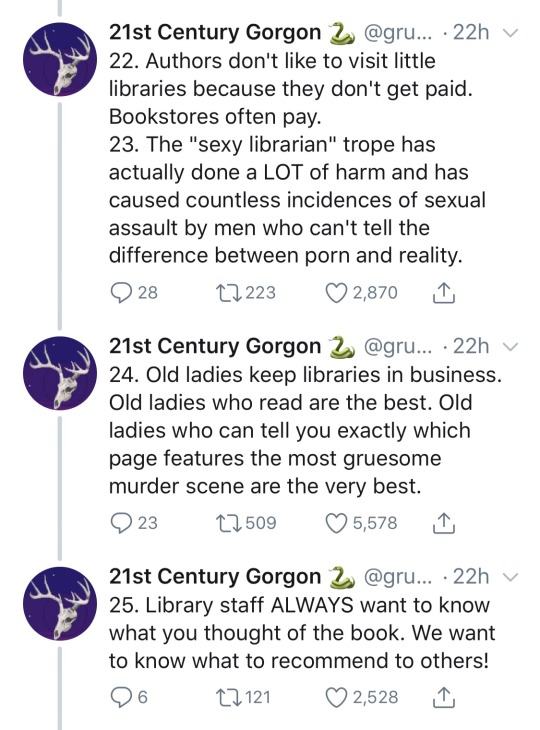
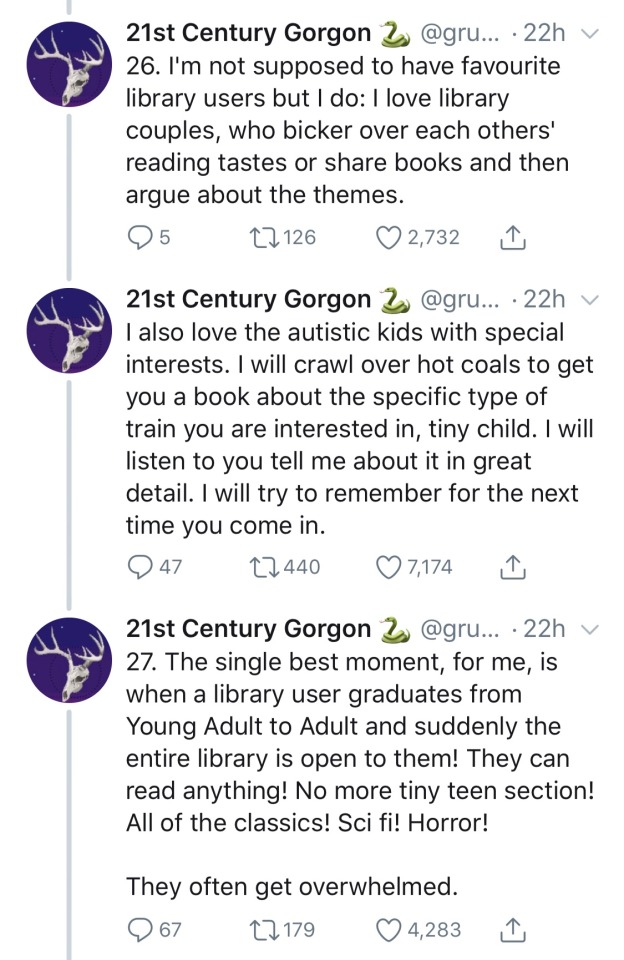
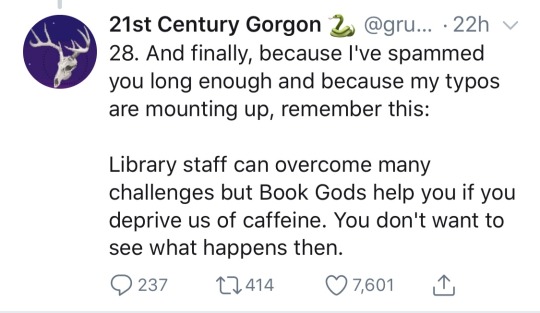
#GO CHECK OUT YOUR LOCAL PUBLIC LIBRARY#its also the most accepting workplace ive EVER worked with#and its unionized!
308K notes
·
View notes